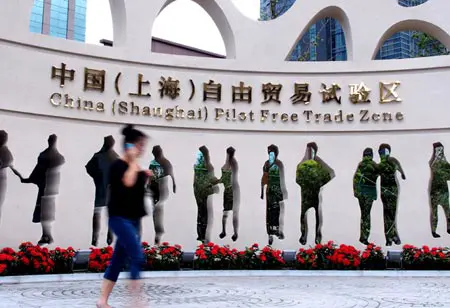Candidates for Iran's 11th presidential election, slated for June 14, began to register on Tuesday. Iranians, who obtain the requirements stipulated in Iran' s Constitution, will be able to sign up for the race until May 11 at the country's Interior Ministry.
Among some 50 hopefuls who registered on the first day, three major political figures, including a moderate, a reformist as well as a principlist, appeared to grab the attention of the media.
MODERATE CANDIDATE
Hassan Rouhani, Iran's former chief nuclear negotiator and incumbent senior member of Expediency Council, said Tuesday on the sidelines of his registration ceremony that "I have always been moderate and have had good and close relations with both moderate principlists and moderate reformists."
"I believe that moderate figures from both principlists and reformists will incline toward me and will support me," he said.
About Iran's nuclear issue, Rouhani said he will try to return Iran's nuclear dossier from UN Security Council to its real place, the International Atomic Energy Agency (IAEA). Iran's nuclear program is "peaceful" and the issue should be settled in the IAEA, he said.
As Iran's chief nuclear negotiator from 2003 to 2005 in reformist President Mohammad Khatami's time, Rouhani led Iran's nuclear negotiations with the European Union trio of Britain, France and Germany.
Rouhani, the candidate of Iran's Moderation and Development Party, said earlier that "parties can play a valuable role in the society" and political parties need to be strengthened in Iran.
Political parties in the Islamic republic do not have a major role in designating the country's political strategies. As for the presidential election, for instance, candidates run for president individually or influential political figures introduce their candidate to the competition.
"Making important decisions will encounter serious problems if parties are not empowered and do not find their (rightful) place," he was quoted as saying by Press TV.
He said he will form a "government of wisdom and hope" and plans to draw up a blueprint on "civil rights" if he wins.
Dynamic culture, pragmatic politics and flourishing economy are three key elements in managing the country, he said.
To set the stage for his campaign, he will soon publish an " economic blueprint," he said, adding that creating "sustainable employment" is at the top of his agenda.
Rouhani also said he will not submit to world powers but will " interact" with them if elected.
In the meantime, former Intelligence Minister Ali Younesi said recently that Rouhani has entered the presidential competition with a full support from former moderate Iranian President Akbar Hashemi Rafsanjani.
An Iranian candidate checks his documents as he registers for Iran's 11th presidential election in Tehran, Iran, May 7, 2013. (Xinhua/Ahmad Halabisaz)
REFORMIST CANDIDATE
Also on Tuesday, the reformist hopeful Mostafa Kavakebian said on the sidelines of his registration ceremony in Iran's Interior Ministry that the reason behind his decision to run for the president is to create "political epic."
"Political epic" is a term which Iran's Supreme Leader Ayatollah Ali Khamenei used to urge the Iranian officials to make efforts for political achievements domestically and internationally.
Kavakebian, former reformist lawmaker in Iran's Majlis, said his slogan for the presidential campaign will be "long live reforms," the name of his government will be "government of ethics " and his chosen color for the campaign will be "green."
In the past presidential campaign in 2009, the green color was a symbol of the reformist candidate Mir-Hossein Mousavi, who was defeated by the incumbent President Mahmoud Ahmadinejad.
Economic reforms will be included in his programs if he wins the vote, the reformist candidate said, adding that he will not endorse paying cash to people as a means to compensate for the subsidy cut plan, a controversial economic project that was adopted by the Ahmadinejad administration.
In December 2010, Ahmadinejad launched his economic reform plan aimed at cutting government subsidies on key consumer goods, including gasoline, natural gas, electricity and some food items, saying that all subsidies would gradually be removed during a five- year period.
Since then, every Iranian has been receiving 455,000 rials (13 U.S. dollars) in cash every month as compensation for the subsidy cut.
Kavakebian also said the income from the subsidy reform plan should partially go to the production sector, as the sector has suffered a lot in recent years and in most cases the employers have fired their laborer staff and have transferred their capital to business market.
Kavakebian, head of Democracy Party, said earlier that five major programs top his agenda in his bid for presidency -- advanced economy, serving sincerely, removal of sanctions against the country, comprehensive reforms and sticking powerfully to the law.
PRINCIPLIST CANDIDATE
Another presidential hopeful, Kamran Baqeri-Lankarani, said after his registration on Tuesday that he will work to upgrade the living condition of underprivileged strata of society in case he comes out victorious.
Baqeri-Lankarani, former health minister in Ahmadinejad's cabinet and the current nominee of the principlist Perseverance Front for presidency, has earlier described fighting and preventing corruption as one the important duties of the administration.
Baqeri-Lankarani said the county's economic problems are rooted in Iran's oil-dependent economy, adding that Ahmadinejad's subsidy reform plan must be blamed for the recent woes, according to Press TV.
Baqeri-Lankarani has pledged that foreign policy, economy and culture are going to top his agenda, and vowed to select highly competent figures from different political fronts as his cabinet ministers, if he is elected, said Press TV.
In a two-week period, the Iranian Guardian Council of Constitution will study the qualification of the candidates on the basis of a number of principles among them -- their belief in "the fundamental tenets of the Islamic republic and the country's official religion."
The president of Iran is elected for a four-year term.
 简体中文
简体中文

